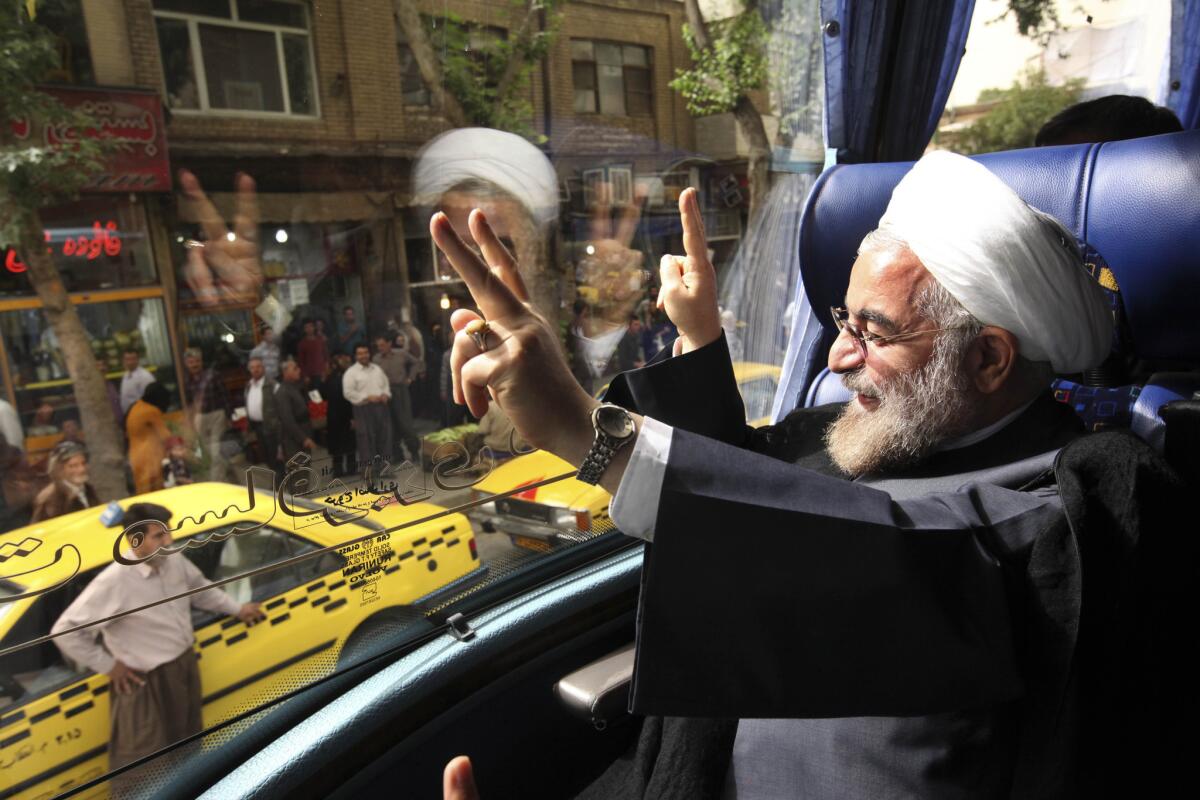Hassan Rouhani’s burden

- Share via
Iran will inaugurate its seventh president on Aug. 4. Hassan Rouhani assumes power at a time when the Islamic Republic is confronting international isolation and simmering domestic discontent. He has already changed the tone of the regime, promising moderation and a fresh look at Iran’s many quandaries. The temptation to embrace an Iranian politician who speaks the language of pragmatism may prove irresistible. However, as Rouhani settles into office, it is best to hold back and see how much authority he will have on the nuclear issue and how much of his political capital he is willing to spend on redeeming his campaign pledges.
Rouhani has been a regime insider since the beginning of the Islamic Republic in 1979. His ability to traverse the treacherous waters of the theocracy reflects his unparalleled political acumen. He spent his tenure as the secretary of the Supreme National Security Council settling disputes, dispensing favors and cultivating national figures.
Paradoxically, Iran’s nuclear issues, which helped get him elected this time, also proved his undoing a decade ago. In 2004, supreme leader Ayatollah Ali Khamenei cynically blamed Rouhani, Iran’s nuclear negotiator, for the nation’s voluntary suspension of its nuclear program. Rouhani was eased out of his position of influence. The resentment between the two men is palpable, as they have spent the last few years subtly criticizing each other.
Rouhani’s improbable presidency does not absolve him of the need to reassure a skeptical international community. For the entirety of the Obama presidency, Iran has rejected sincere offers of dialogue, reneged on its promises of cooperation and denounced U.N. Security Council measures as illegitimate and illegal. And this is only on the nuclear front. The Islamic Republic remains an aggressive supporter of the Assad government in Syria and an array of terrorist groups plotting against incumbent Arab states. Given its record of defiance and mendacity, Tehran needs to prove its sincerity of purpose.
One way of determining the scope of Rouhani’s authority is to hold him accountable for his promises. Iran persistently claims that its nuclear program is firmly anchored in the nuclear nonproliferation treaty and is merely designed for production of energy. Government functionaries are quick to point out that the treaty grants all member states the right to peacefully pursue the limits of nuclear science. They conveniently neglect to mention that Iran has been censured by numerous International Atomic Energy Agency injunctions, and that the agency is unsatisfied with Tehran’s record of compliance. The traditional practice of the Islamic Republic is to insist on its rights while denying its obligations.
It is Rouhani’s burden to change all that. In his first postelection news conference, Rouhani addressed the nuclear issue and stressed that “Iran will be more transparent to show that its activities fall within the framework of international rules.” For many years, Iran has been unwilling to grant the IAEA access to its key installations and scientists and to come clean about previous weaponization activities. Perhaps in this new era of transparency, Rouhani will be willing to negotiate a plan with the IAEA and grant its inspectors the access long denied them. Should Rouhani pass this rather modest test, then he may be a figure the great powers can invest in.
Rouhani’s own record is not beyond reproach. He has said that he used the time during Iran’s nuclear program suspension to make advances by exploiting the ambiguities of the agreement. In October 2009, when Iran seemingly agreed to a confidence-building measure of shipping a portion of its enriched uranium for reprocessing abroad, Rouhani joined the chorus of officials denouncing that gesture.
“I still don’t know the reason for the mistake made at home, what it is and why the proposal was made,” Rouhani said at the time. He was among the first officials to call for Iran to escalate its uranium enrichment level to 20%, which brings it much closer to weapons-grade production.
Rouhani has shown a prudent and thoughtful side by being a persistent critic of outgoing President Mahmoud Ahmadinejad. The new president’s commitment to rehabilitating Iran’s strained international relationships and rejuvenating its economy seems genuine. However, given the record of the state that he represents, it behooves Rouhani to move beyond rhetorical gestures and take concrete steps. Coming to terms with the IAEA would constitute an important first move for a leader who has called on all powers to respect the integrity of international treaties.
Takeyh is a senior fellow at the Council on Foreign Relations.
More to Read
A cure for the common opinion
Get thought-provoking perspectives with our weekly newsletter.
You may occasionally receive promotional content from the Los Angeles Times.






